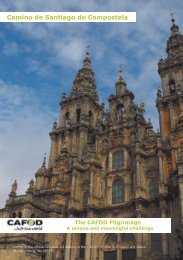Religious Education Curriculum Directory (3-19) - The Catholic ...
Religious Education Curriculum Directory (3-19) - The Catholic ...
Religious Education Curriculum Directory (3-19) - The Catholic ...
- No tags were found...
You also want an ePaper? Increase the reach of your titles
YUMPU automatically turns print PDFs into web optimized ePapers that Google loves.
<strong>Religious</strong> <strong>Education</strong> <strong>Curriculum</strong> <strong>Directory</strong>What the strands are aboutAT1 Learning about Religion:Knowledge and Understanding ofi) beliefs, teachings and sourcesHere pupils will be learning about what peoplebelieve, about the faith they hold and how thathelps them to make sense of the world; theywill learn about the teachings of different religioustraditions and the answers those traditionsgive to questions of meaning andpurpose; they also will learn about the sourcesthat different traditions use to guide them intheir understanding of faith, belief and practice;they will learn how to engage criticallywith such source material.ii) celebration and ritualIn this strand pupils will be looking at the waysin which faith is celebrated; how that takes differentforms in different times and for differenttraditions; they will be able to explore differentliturgies (the public worship of the Church) anddifferent rituals (such as the festivals of a differenttradition) and the place of actions, wordsand symbols within them; they will learn aboutthe significance of these celebrations for believersand see how the spiritual life can beanalysed and expressed.iii) social and moral practices and way of lifeAT2 Learning from Religion:Reflection on meaningi) engagement with own and others’ beliefs andvaluesThroughout this strand pupils will be reflectingon beliefs and values; by talking, exploring, discussing,thinking, responding and questioning,pupils will be increasingly able to structure andarticulate their thoughts; they will be able tolisten attentively to others and come to understandand empathise with others’ views, beliefsand values; they will develop the ability to engagecritically with their own and others’ religiousbeliefs and world views.ii) engagement with questions of meaning andpurposeIn this strand pupils will be confronting the difficultquestions which all people have to face;they will be thinking critically about their ownquestions of meaning and purpose and aboutthe ways in which people of all faiths and nonehave struggled with similar questions; they willbe exploring the evidence and arguments usedby people of different faiths and other traditionsto justify their position; they will be developingthe ability to express their own pointof view.Pupils will learn about the ways behaviour isinfluenced by what people believe, whetherthat is in religious practice (e.g. actions) ortheir general way of life, for example the waysin which the <strong>Catholic</strong> Christian interacts withthe world; they will learn about the ways inwhich religious belief shapes their lives and theway they see and interpret society and theworld; they will learn to understand the religiousand moral basis for certain belief systems.64
















